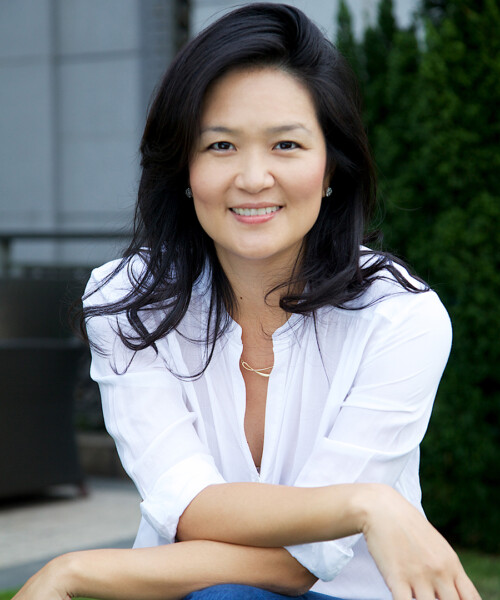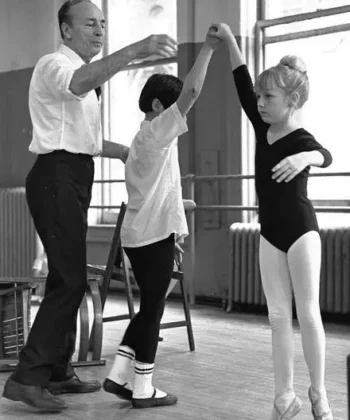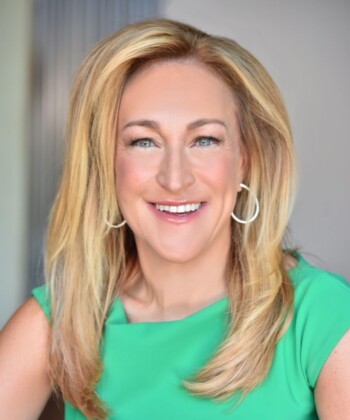“I started out with this image of a woman lying in bed who didn’t want to get up,” says Janice Y.K. Lee. “And that was all I had.”
In more ways than one, this statement is indicative of the story Lee would spin from the threads of this image—the story that would become her second novel, The Expatriates. The image—a woman lying in bed, not wanting to get up—is relatable to almost every woman on the planet. But it’s the instinct to climb under the covers with this woman—to ask her why she doesn’t want to get up, and not shy from the answer—that enabled Lee to write a truly powerful novel about the ways in which women shudder under the blow of life’s unbidden tragedies.
Like her first novel, the critically acclaimed and New York Times bestseller The Piano Teacher, this story is set in Lee’s hometown, Hong Kong. The Expatriates follows three American women whose lives are connected—some very tightly, some more loosely—by a tragedy that it seems impossible to recover from. With a gimlet eye for instants of comedy, hypocrisy and sanity alike, Lee navigates the peculiarly over-accommodating yet isolating world in which these women live, and winds them together with a fact they cannot escape: they are women.
Here, we sat down with Lee to talk about The Expatriates, Hong Kong and the joys of Netflix.
Your last two novels were set in Hong Kong, which is such a rich backdrop, just teeming with so many people and cultures.
Yes, Hong Kong is an amazing, gorgeous city, and there are an awful lot of people. But this second book is actually very insular, which I feel apologetic about and yet don’t. When you look at the immense humanity and population of Hong Kong, it’s completely different from the world I am talking about in The Expatriates. That’s the local population, and for most expats the two worlds never meet. They are quite separate. Not because the expats don’t want to know about the locals—it’s just more difficult. You don’t speak the same language; you don’t have the same culture; you don’t have the same reference points. So in a way you live a parallel life with this enormous, bustling metropolis of millions of people, while your actual community [of expats] is only about 2,000. It’s very small.
So how much of your life did you live in Hong Kong?
So I lived there until I was 15, and then came to the U.S. for boarding school, and stayed here from high school until I was in my 30’s. And then in 2005, I moved back to Hong Kong and lived there for the past ten years. We just moved back to New York this summer.
Was it during your return to Hong Kong as an adult that you gleaned more of an understanding of the expat community?
Well, when I was growing up there, I went to the international schools and a lot of my friends were expats. I guess in a way I was an expat as well because my parents had come from Korea and then settled in Hong Kong. But living there as an adult, and as a mother, was a totally different world.
One of the most powerful influences on the women’s lives in this book is the presence of their hired help.
It’s really interesting. Almost everywhere else in the world—except for maybe Europe—people just have so much more help. And it really affects your life in so many different ways.
This novel is told almost exclusively from the perspectives of three women—all of whom are very complicated, grieving in one way or another, and not always likeable. How did you come to terms with this material?
Well I love the idea of sort of reversing the male gaze. So much of the world is already seen through male eyes, whether we see it or not. But also, in this world of the trailing spouse that I’m depicting, women are almost exclusively hanging out with other women. They have their children, but they have the luxury of time because all the labor has been taken over by someone else. So you get to know these other women very deeply. The men are often traveling because the nature of working in Hong Kong or Asia is that you’re mostly traveling to other regions, and it’s not to say the husbands aren’t present or good fathers—they just aren’t around during the day. It’s like this for a lot of women who are stay at home mothers, but it’s just more intense in Hong Kong, because you’re in a bit of a petri dish. It’s a lot like college. I joke that a lot of my time in Hong Kong was spent on my friends’ couches. I’m working now, and I was working then on my book, but I just felt like there was more time for other women and friendship. I feel like this book was my ode to all those deeply complicated things that women handle with such grace most of the time.
So do you have any idea about what’s up next on the docket for you?
Well at the moment I’m just trying to survive moving back to New York with four kids. It’s like full on French! But, I really think so much good writing is happening in television right now, so my ambition is to watch a lot more TV this year. I think I am going to start in February… I’m just going to lie in bed all day while my kids are at school.
Oh, Netflix will help you out with that.
I just got Netflix! That’s another thing in Hong Kong—you can’t get Netflix or Hulu because there’s so much pirating. You couldn’t get any of that, so you had to find some work-around. It was crazy. Now, I’m like I have so much to watch.






































